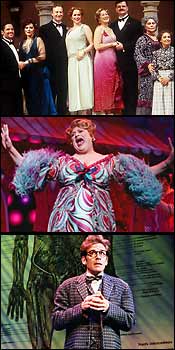
Take a look at the list of tony nominees announced last week, and it’s clear that Broadway’s troubles don’t all have to do with the lack of tourists, war in Iraq, the crummy economy, the smoking ban, the extremely entertaining pissing match between the New York Post and the Times over coverage of Gypsy, or any of the other events great and small affecting our lives these days. Indeed, the nominations make one thing abundantly clear: There is something wrong with Broadway, and it has nothing to do with the rest of the world. Which is the point: Broadway has nothing to do with the rest of the world. At least not the world we’re living in.
Best Play: Enchanted April, about four repressed Englishwomen let loose in Italy during the decidedly unroaring twenties; Say Goodnight Gracie, a one-man show about a famous dead comedian and his equally dead wife; Vincent in Brixton, about Vincent van Gogh’s brief London sojourn more than a century ago; and Take Me Out, about a big-league baseball player who comes out of the closet (and into the shower), setting off a chain of melodramatic events that would be right at home on daytime TV.
Best Musical: Amour, about a Parisian clerk in the fifties who uses his newly won ability to walk through walls to woo the married woman he loves; A Year With Frog and Toad, about the close friendship of two men with intimacy issues; Hairspray, about Baltimore in the sixties, rock and roll, and a mother and daughter who have intimacy issues; and Movin’ Out, about the Vietnam War and Billy Joel’s songs. Oh, and intimacy issues.
Don’t get me wrong—I had a great time at several of these shows, and so, probably, did you. Through an apparently miraculous bit of luck, I’ve actually seen Bernadette Peters as Momma Rose in Gypsy (which is more than may be said for the majority of patrons in attendance in the weeks immediately before and after the revival opened, when illness landed Peters on the disabled list). Twyla Tharp’s brutally beautiful choreography in Movin’ Out might almost convince us that this dance concert is a Broadway musical (after all, it worked for Contact). And Hairspray, with its themes of integration, fat-girl liberation, and the durability of marriage—not to mention its endearing performance by Harvey Fierstein in glorious drag—offers great values, if not value, for your $100 ticket.
Given the field, the Tony nominators did a better-than-usual job of separating wheat from chaff. But handed this, we have every right to ask producers: What planet are you living on? Of course, we also know what the response is: Planet Disney. Here, the goods for sale are nearly all about escape—to London, Paris, even Vietnam; to any time but the present. Where’s the new work that speaks to the issues we struggle with every day? If the locker-room antics of Take Me Out are the best Broadway can offer in the name of contemporaneity, we’ve come a very long way in the ten years since Angels in America played at the same Walter Kerr Theatre. In the wrong direction.
The season offered two significant exceptions to the “fantasy rules” theme, though they’re competing for Best Special Theatrical Event, a relatively new (and welcome) category: spiky Bill Maher’s limited-run Victory Begins at Home and Russell Simmons’ Def Poetry Jam, an angry-exuberant ensemble concert that brought a lot of young people into the theater—the Rent crowd—but recently closed after a valiant run marked by a lot of half-filled houses.
For the most part, however, this season was one for the aged, not the ages, and no wonder: As young artists—not just writers but actors and designers as well—abandon Broadway for television and film, so too are young producers making tracks. Craig Zadan and Neil Meron, who executive-produced the film of Chicago, are putting Broadway musicals on television and in movie theaters with stunning success. Meanwhile, the Broadway Establishment is an old folks’ club, and you can see its taste reflected in the vast majority of shows that get on.
There are some rule-breakers. Rent producers Jeffrey Seller and Kevin McCollum co-produced Baz Luhrmann’s delicious, Broadway-size version of La Bohème. And there are more women producing on Broadway these days than ever before. But like their male counterparts, they’re taking as few risks as possible, because mounting a Broadway show just costs too much, and most shows fail. That’s why there are 72 producers—that’s not a misprint—named in the eight shows competing in the Best Play and Best Musical categories; Say Goodnight Gracie may be a one-man gig, but it took thirteen producers to get him onstage.
Has this conservatism paid off in long lines at the box office and fat checks to investors? Nah. Among the nominees in the top categories, Hairspray is the only runaway hit of the season. For theater that gives audiences a connection to planet Earth, 2003, you’ll need to turn to Off Broadway, for amazing plays like The Guys and The Exonerated and Our Lady of 121st Street. Or to TV and the movies.
Broadway has always been a marketplace of first-class escapism, and no one should expect otherwise. But it was also a cultural bazaar that for every iteration of the Ziegfeld Follies managed to present the latest Arthur Miller or Tennessee Williams, too. Call me old-fashioned, but the passing of those days is a sad thing.